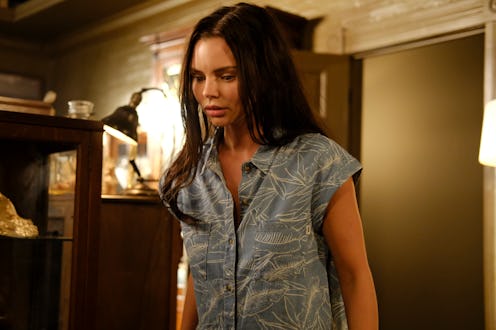Entertainment
Freeform's 'Siren' Tells A Mermaid's Revenge Story Without Making Her The Evil Villain

The revenge story is one as old as time — people do bad things, the person whom the bad things were done to makes sure the others get their comeuppance. As Newton said, for every action, there is an equal and opposite reaction. Freeform’s new series Siren poses as a tale of a murderous mermaid terrorizing a small seaside town, but at a closer look, that mermaid is just standing up to the humans (and their ancestors) who tortured her own kind and continue to do so. The Little Mermaid, this is not.
Bristol Cove is the typical teeny fishing town you see on television. Ben is a conservationist trying to avoid his wealthy family, and when his friends tell him that they caught something weird when they were out on their commercial fishing boat, Ben is skeptical. He knows the sea, and he knows what’s out there. It doesn’t include monsters. But considering that a mermaid (or something) hurt their friend and said friend was carted off by the government, along with the mermaid, something has to be up. Who mysteriously disappears if they only get slashed by a shark? But once Ben finds Ryn, who has mysteriously sprouted legs, staggering around town, he knows something’s up. A fight in the water cements his curiosity, and so Ben turns to a local shop owner, Helen, for information on the mermaids of Bristol Cove. Helen, it turns out, knows what’s up. “In their natural state in the water, [mermaids view] you as prey. Their instinct is to kill. Humans never understood that,” Helen tells Ben. “It caused a lot of misery. Your family’s history in this town is bloodier than you know. Your ancestor … and his shipmates slaughtered those beautiful creatures in cold blood. Genocide. That’s your legacy.”
Firstly, let’s say that mermaids are probably not real. According to the National Oceanic and Atmospheric Administration, “No evidence of aquatic humanoids has ever been found. Why, then, do they occupy the collective unconscious of nearly all seafaring peoples? That’s a question best left to historians, philosophers, and anthropologists.”
And in those professions, mermaids have been vilified since stories could be told. According to Jezebel, the history of mermaids probably began with the ancient Syrian goddess Atergatis, but other cultures have similar myths — Lasiren in the Caribbean; Mami Wata in Africa; and of course, the sirens of Greek mythology, most famously exemplified in The Odyssey. These sirens would sing out, capturing sailors with their song and leading them off course and to their deaths. According to Wired, some say that mermaids could even change the weather and sea conditions, causing ships to sink and whole crews to be lost. Mermaids and mermen were bad luck.
So, Ben’s ancestors decided to slaughter something that they couldn’t understand. The unknown is scary, and to “other” something that’s not like you is extremely human. But it also makes sense that, in light of all of the slaughter, Ryn is ready to fight back against the humans that surround her when she’s on land. She’s fragile when she’s out of the water — it seems as if she has a limited time to breathe on land, before her gills and scales come back — but she has her own agency. Ryn is looking for her lost “sister,” the one the government is holding against her will, and she won’t stop until these humans give her back. Ryn can claw and steal and fight, and she does, most notably when a man who is giving her a ride in his car attempts to sexually assault her. We don’t see exactly what Ryn does to him, but we do see his body fly, dead and bloodied, through the windshield of his car. He will not be around to touch Ryn again.
Through this lens, then, the mermaids, who were systemically hunted and killed, are well within their rights to reclaim what was theirs. Hell, they just want to be left alone in the water to hunt and play in the depths. They were probably just singing to each other to communicate when humans (mostly men, let’s face it) decided that they just couldn’t resist the song. These women were minding their own business and suddenly, groups of sailors started dropping in. Women are always blamed for corrupting men when, really, men should be able to control their own urges.
That said, how will Ben handle knowing that Ryn and her kin are actually out there? He is a marine biologist, dead-set on conservation. He traps, tags, and releases the sea life near Bristol Cove to monitor populations. Will he do the same to Ryn? Ben will have to fight against humankind, if that’s the case, because the human population will not understand why he’s protecting what they think is an evil sea monster. Ben’s motives for helping Ryn are two-fold — he positions himself as a friend to all creatures, but he also craves distance from his family. To help Ryn and her people, Ben will have to correct the sins of his ancestors — but Ryn might get to them first, anyway — because she's had enough and she's fighting back.